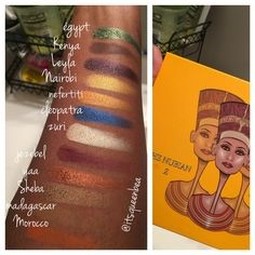 Andrea Tyson Staff Writer It is time to head to the drugstore and find your perfect foundation match. You instantly spot a new foundation display. You start picking up the bottles and begin reading the shade names ‘Snow,’ ‘Porcelain,’ ‘Ivory,’ and ‘Tan,’ but where is the other half of the shades? Why are you not seeing ‘Caramel,’ ‘Ebony,’ ’Mocha,’ ‘Cocoa,’ or ‘Mahogany’ for those with deeper complexions? Is the absence of color at the drugstore solely an inconvenience, or could this be borderline colorism? Colorism is a situation where people with lighter skin tones are treated better than those with deeper skin tones. An example of colorism could be the paper bag test; in this test African-American students whose skin was lighter than a paper bag could sit in the front of the classroom while those with complexions deeper than the bag had to sit in the back. In 2016 the average woman spends $2,000 per year on personal hygiene products, which includes everything from concealer and shampoo to whitening toothpaste. African-American women hold a buying power of $1 trillion, and this number is expected to exceed to $1.3 trillion in 2017. With a buying power this high, why would companies not want to offer more products for women of color? That was a trick question; makeup brands are beginning to appeal to women of color but only because of their spending power and social media. It is all about the money, honey. In recent years, drugstore brands have used women of color for celebrity endorsements of new product lines. Lupita Nyong’o is a face for Lancome; Beyonce partnered up with L'oreal, Sofia Vergara with Covergirl, and Halle Berry with Revlon. These partnerships may help, but many women said the companies still failed to deliver products catered towards their unique skin tones. Women of color are seeing these models with deeper complexions but are still disappointed when they come home and test out the product. The shade looks perfect in the bottle, but the undertone is cool instead of the warm undertones most women of color need. To voice these problems, women have gone to social media.
Alyssa Forever and Alissa Ashley are two beautiful, talented young women who have their own YouTube channels. The pair created the Black Owned Makeup Brands challenge. If women cannot find the cosmetic colors from more popular brands, it only makes sense to buy makeup from people who know your struggle: other black women and women of color. Women of color are not solely African American but can also be Latino, Indian, or anyone with some brown in their complexion. In their videos, Alyssa and Alissa both created full face makeup looks solely using products from black-owned brands. At the end of their videos, the two encourage other women, including those with lighter complexions, to support these brands. This challenge also gave smaller brands the recognition that they usually would not get in the mainstream media. Wanting more diversity in the makeup industry is usually what drives these young, black entrepreneurs to create makeup lines catered to women of color because they know how hard it can be to find flattering makeup. Black women are spending nine times more on these ethnic targeted beauty and grooming products. ChiChi Ebaru is a woman who created her own makeup line for these exact reasons. Ebaru is a Nigerian-born wife and a mother of two young children. She created her brand “Juvia’s Place” almost two years ago, and her company has grown tremendously since then. In an interview with Blackgirllonghair.com, Ebaru said, “I’m African, that’s my background. I took a look at the beauty industry and there was nothing that truly represented black culture. I feel like the market is here, we’re here [black women] and we’re beautiful and nobody is listening. To me the idea of a Nubian queen is representative of a beautiful black woman and that’s what I wanted my company to show.” Having a deep complexion herself, Ebaru says she always goes the extra mile to make sure that the makeup her brand puts out will work for everyone. She told Blackgirllonghair.com, “I have dark skin, so anytime I pick colors, I always test on my skin and even darker skin tones and we compare colors that will pop. That’s how we pick our products. If it shows on my skin and on darker skin then it will show on anyone’s skin. For me personally, I want colors that any woman of color can wear. A lot of the bigger brands don’t go that extra step and it shows. I want to be able to produce products that women of color can wear comfortably and not look like a clown.” The effort that Ebaru has put into her brand is definitely paying off. With an increasing following on social media, her products are great for everyone. Her eyeshadow palettes have gotten great reviews from beauty bloggers and women from all over the world. What do you think of the lack of diversity in the cosmetic industry? Is this problem due to a lack of demand, or are companies ignoring what their consumers want? When will the foundation shades on display match the faces of all the people trying to buy them? Comments are closed.
|
Archives
March 2017
Categories
All
|

